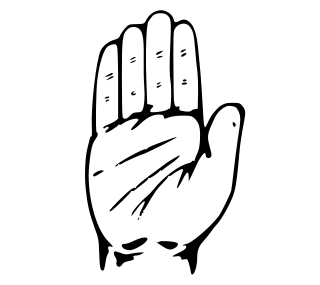Conservatism is a political and social philosophy promoting traditional social institutions in the context of culture and civilization. The central tenets of conservatism include tradition, hierarchy, and authority, as established in respective cultures, as well as property rights. Conservatives seek to preserve a range of institutions such as organized religion, parliamentary government, and property rights, with the aim of emphasizing continuity. Adherents of conservatism often oppose modernism and seek a return to "the way things were".

The Communist Party of China, commonly known as the Chinese Communist Party (CCP), is the founding and sole governing political party of the People's Republic of China (PRC). The CCP leads eight other legally permitted subordinate minor parties together as the United Front. The CCP was founded in 1921, with the help of the Far Eastern Bureau of the Russian Communist Party (Bolsheviks) and Far Eastern Secretariat of the Communist International. The party grew quickly, and by 1949 it had driven the Kuomintang (KMT)'s Nationalist Government from mainland China to Taiwan after the Chinese Civil War, leading to the establishment of the People's Republic of China on 1 October 1949. It controls the country's armed forces, the People's Liberation Army (PLA).
The Politics of India works within the framework of the country's constitution. India is a parliamentary secular democratic republic in which the President of India is the head of state and the Prime Minister of India is the head of government. It is based on the federal structure of government although the word is not used in the constitution itself. India follows the dual polity system, i.e. a double government that consists of the central authority at the centre and states at the periphery. The constitution defines the organisational powers and limitations of both central and state governments, and it is well recognised, fluid and considered supreme; i.e. the laws of the nation must confirm to it.
In politics, a political party is an organized group of people who have the same ideology, or who otherwise have the same political positions, and who field candidates for elections, in an attempt to get them elected and thereby implement their agenda. Political parties are a defining element of representative democracy.

The United Kingdom is a unitary state with devolution that is governed within the framework of a parliamentary democracy under a constitutional monarchy in which the monarch, currently Queen Elizabeth II, is the head of state while the Prime Minister of the United Kingdom, currently Boris Johnson, is THE head of government. Executive power is exercised by the British government, on behalf of and by the consent of the monarch, and the devolved governments of Scotland, Wales and Northern Ireland. Legislative power is vested in the two chambers of the Parliament of the United Kingdom, the House of Commons and the House of Lords, as well as in the Scottish and Welsh parliaments and the Northern Ireland Assembly. The judiciary is independent of the executive and the legislature. The highest court is the Supreme Court of the United Kingdom.

The United States is a federal constitutional republic, in which the president, Congress, and judiciary share powers reserved to the national government, and the federal government shares sovereignty with the state governments.

The Republican Party, also referred to as the GOP, is one of the two major contemporary political parties in the United States, along with its main, historic rival, the Democratic Party.
The Whig Party was a political party active in the middle of the 19th century in the United States. Alongside the slightly larger Democratic Party, it was one of the two major parties in the United States during the late 1830s, the 1840s, and the early 1850s, part of the Second Party System. Four presidents were affiliated with the Whig Party for at least part of their respective terms. Other influential party leaders include Henry Clay, Daniel Webster, William Seward, John J. Crittenden, and Truman Smith.

A one-party state, single-party state, one-party system, or single-party system is a type of unitary state in which one political party has the right to form the government, usually based on the existing constitution. All other parties are either outlawed or allowed to take only a limited and controlled participation in elections. Sometimes the term de facto one-party state is used to describe a dominant-party system that, unlike the one-party state, allows democratic multiparty elections, but the existing practices or balance of political power effectively prevent the opposition from winning the elections.

The Bharatiya Janata Party is one of two major political parties in India, along with Indian National Congress and the ruling political party of the Republic of India since 2014. As of 2019, it is the country's largest political party in terms of representation in the national parliament and state assemblies and is the world's largest party in terms of primary membership. BJP is a right-wing party, and its policy has historically reflected Hindu nationalist positions. It has close ideological and organisational links to the much older Rashtriya Swayamsevak Sangh (RSS).

The Indian National Congress is a political party in India with widespread roots. Founded in 1885, it was the first modern nationalist movement to emerge in the British Empire in Asia and Africa. From the late 19th century, and especially after 1920, under the leadership of Mahatma Gandhi, Congress became the principal leader of the Indian independence movement. Congress led India to independence from Great Britain, and powerfully influenced other anti-colonial nationalist movements in the British Empire.
American electoral politics has been dominated by two major political parties since shortly after the founding of the republic. Since the 1850s, they have been the Democratic Party and the Republican Party. Since the last major party realignment in the mid-20th century, the Democratic Party has been the center-left and liberal party, and the Republican Party has been the center-right and conservative party. Since the 1990s, both the Republican and Democratic parties have shifted further apart. This two-party system is based on laws, party rules and custom, not specifically outlined in the US Constitution. Several third parties also operate in the U.S., and from time to time elect someone to local office. The largest third party since the 1980s has been the Libertarian Party. Besides the Constitution, Green, and Libertarian parties, there are many other political parties that receive only minimal support and only appear on the ballot in one or a few states.
An independent or nonpartisan politician is a politician not affiliated with any political party. There are numerous reasons why someone may stand for office as an independent.
The Democratic Party is one of the two major contemporary political parties in the United States, along with its main, historic rival, the Republican Party. Tracing its heritage back to Thomas Jefferson and James Madison's Democratic-Republican Party, the modern-day Democratic Party was founded around 1828 by supporters of Andrew Jackson, making it the world's oldest active political party.
The Labour Party is a centre-left political party in the United Kingdom that has been described as an alliance of social democrats, democratic socialists and trade unionists. In all general elections since 1922, Labour has been either the governing party or the Official Opposition. There have been six Labour prime ministers and thirteen Labour ministries.
Centrism is a political outlook or position that involves acceptance or support of a balance of social equality and a degree of social hierarchy, while opposing political changes which would result in a significant shift of society strongly to either the left or the right.
Centre-left politics or center-left politics, also referred to as moderate-left politics, are political views that lean to the left-wing on the left–right political spectrum, but closer to the centre than other left-wing politics. Those on the centre-left believe in working within the established systems to improve social justice. The centre-left promotes a degree of social equality that it believes is achievable through promoting equal opportunity. The centre-left emphasizes that the achievement of equality requires personal responsibility in areas in control by the individual person through their abilities and talents as well as social responsibility in areas outside control by the person in their abilities or talents.







